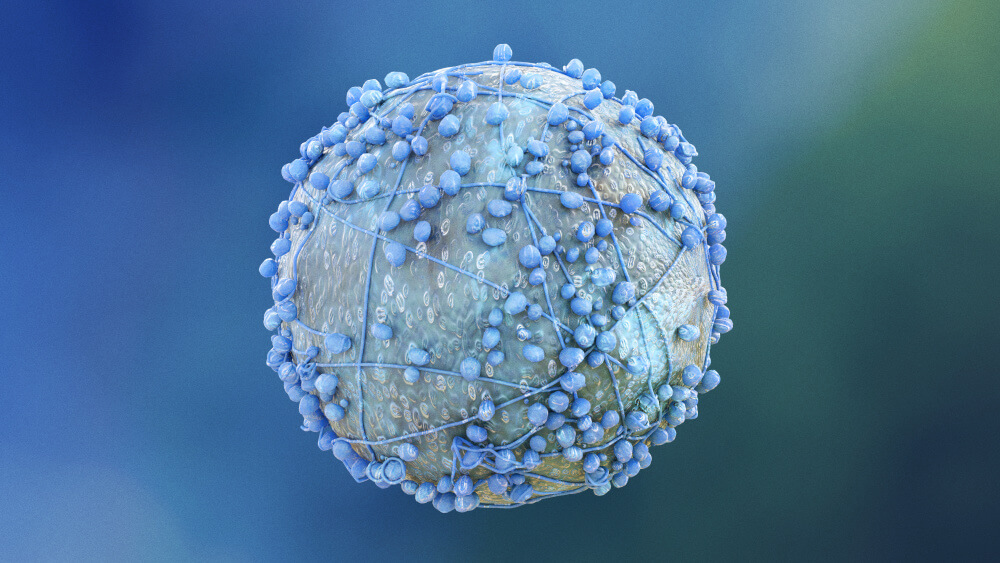Physicians have long known that there is a link between diabetes and pancreatic cancer, a connection that Dana-Farber’s Brian Wolpin, MD, MPH, calls “quite unique.”
Even though pancreatic cancer is only the 11th most common cancer in the US, it is the 3rd leading cause of death by cancer. Without screening options, pancreatic cancer is often found after it has spread to other nearby organs. At that point, it’s more difficult to treat.
For Wolpin, this leads to a simple conclusion: “To cure more people with pancreatic cancer, we’re going to have to find the cancer early.” In its earlier stages pancreatic cancer can be removed with surgery and treated with chemotherapy, which leads to higher rates of survival. The link between diabetes and pancreatic cancer may offer avenues to earlier diagnosis.

How are pancreatic cancer and diabetes linked?
Diabetes is a set of several conditions which affect how the body regulates blood sugar levels via insulin and other hormones. In part, insulin controls the amount of sugar in your blood by moving it into cells to be used as energy. The pancreas produces insulin, and in the relatively rare type 1 diabetes, the immune system attacks the cells in the pancreas that produce insulin.
In type 2 diabetes, the body is unable to use the insulin it creates. Living with diabetes for a long time is a known risk factor for pancreatic cancer. Although researchers have been unable to determine the reason with certainty, this link could be a result of the heightened levels of insulin or long-term pancreatic inflammation caused by type 2 diabetes.
In some cases, instead of diabetes affecting the pancreas, a problem in the pancreas causes new-onset diabetes. This rare form of diabetes is sometimes called pancreatogenic or type 3c diabetes. Estimates suggest that this makes up only 1% of new diabetes diagnoses, and of that the minority, only 0.4 to 0.8% are caused by pancreatic cancer. Other causes include the consequences of chronic inflammation or cystic fibrosis.
Diabetes research may lead to improved early detection
The small subset of type 3 diabetes diagnoses stemming from pancreatic cancer may offer answers to detecting the cancer early. Sending everyone with a new diagnosis of diabetes for imaging is not feasible given this is a common diagnosis in the general population, but patients with type 3 diabetes may have specific characteristics or biomarkers in the blood which could be used in a diagnostic test. Creating a blood test to detect early-stage pancreatic cancer has historically been a challenge. Most patients have advanced pancreatic cancer, and their blood will reflect late-stage disease.
The national New Onset Diabetes Study hopes to change this. Thousands of patients with a new diabetes diagnosis will give blood samples for up to three years. Researchers are looking for proteins and other biomarkers which are different in participants who later develop pancreatic cancer compared to those who don’t.
Researchers are also examining criteria for determining the risk of cancer in the setting of new-onset diabetes called the Enriching New-Onset Diabetes for Pancreatic Cancer (ENDPAC) score. Patients facing a new diabetes diagnosis who are at risk for pancreatic cancer tend to be older, their blood sugar rises quickly, and they lose weight (in typical type 2 diabetes cases, patients gain weight). Considering this complete picture, and other risk factors including a family history of pancreatic cancer, a physician may recommend further testing after a diabetes diagnosis.
There are other possible routes to developing early detection methods. Wolpin and his team are collaborating with cancer centers nationally to gather data around genetic mutations, imaging tests, stool samples, and medical records from patients with pancreatic cancer. Promising studies at Dana-Farber have shown that artificial intelligence may be able to use this information to find signs of early-stage pancreatic cancer.
Wolpin says that the link between diabetes and pancreatic cancer may have therapeutic implications too. It’s possible that the insulin secretion which occurs in diabetes “spurs pancreatic cancer to grow faster” and makes it more resistant to treatment. This could present an opportunity to weaken those types of cancer by slowing insulin production. As research at Dana-Farber progresses, survival will continue to improve.
About the Medical Reviewer

Dr. Wolpin received his medical degree from Harvard Medical School in 2001. He subsequently completed his residency in Internal Medicine at Brigham and Women's Hospital, and his fellowship in Medical Oncology at the Dana-Farber Cancer Institute. He joined the staff of DFCI and Brigham and Women's Hospital in 2007, where he is a medical oncologist and clinical investigator in the Center for Gastrointestinal Oncology. His research focuses on biomarkers and novel therapeutics in gastrointestinal malignancies, and mechanisms by which lifestyle factors interact with malignant risk and progression.
